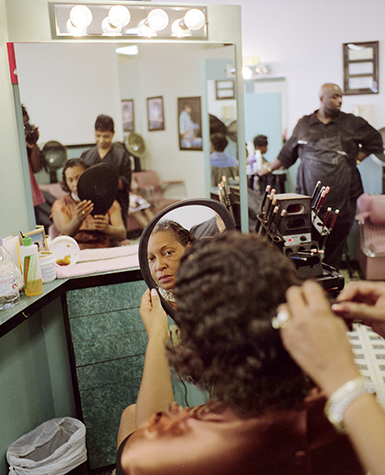Chicago Humanities Festival: Photography and Community
September 28, 2021
7:00 PM
Community-based photography provides a lens through which to record the intergenerational visual history of people and places as seen from the artist’s insider perspective.
Chicago Humanities Festival convenes a virtual panel discussion on how artistic concerns—from identity, inclusion and representation, to ethics and consent—relate to the traditions of documentary photography. Join photographers and filmmakers Louis Massiah, Carlos Javier Ortiz, Wendy Ewald, and Deborah Willis for a conversation about photography for and by community members.
FREE. Please register in advance for the the event link.
This program is presented in partnership with the Smart Museum of Art at the University of Chicago, in conjunction with the multi-partner, multi-venue exhibition Toward Common Cause: Art, Social Change, and the MacArthur Fellows Program at 40.
About the presenters
Deborah Willis, Ph.D, is university professor and chair of the Department of Photography & Imaging at the Tisch School of the Arts at New York University where she teaches courses on photography and imaging, iconicity, and cultural histories visualizing the black body, women, and gender. Willis is a photographer, author and co-author of numerous publications, including The Black Civil War Soldier: A Visual History of Conflict and Citizenship, Posing Beauty: African American Images from the 1890s to the Present; Envisioning Emancipation: Black Americans and the End of Slavery; and Michelle Obama: The First Lady in Photographs; the latter two titles are NAACP Image Award winners. She has curated photography exhibitions at Kalmazoo Institute of the Arts, the International Center of Photography, and Indiana University and appeared and consulted on media projects including Through A Lens Darkly and Question Bridge: Black Males which received the ICP Infinity Award 2015. Willis is the recipient of the John D. and Catherine T. MacArthur Fellowship and a John Simon Guggenheim Fellowship.
Wendy Ewald is an artist defined by collaboration. Over a 50-year career she has distributed cameras to children and adults, teaching them rudimentary photography skills and asking them to photograph their lives. Born in 1951 in Detroit, Ewald’s family was deeply enmeshed in the world of photography. Her grandfather invented roadside billboards with images and her house was full of photographic paraphernalia. Though photography was a constant in her life, she was the one in the family to question and probe its meaning and possibilities. There is a documentary quality to the work that could almost be classified as anthropological, were it not for the fact that Ewald is more interested in the perspective of those being studied than those doing the studying. This drive to understand people in their contexts has taken her around the world. From early work in Appalachia to South Africa, Mexico, England, Israel, and the West Bank, she has been drawn to places of conflict. Ewald shifts the focus from event to people, intimately drawn into the lives of those with whom she works.
Louis Massiah is a documentary filmmaker and the founder of the Scribe Video Center in Philadelphia, a media arts center that provides production workshops to community groups and emerging independent media makers. As an educator and institution builder, Massiah has developed media production methodologies that assist first time makers author their own stories, including the Precious Places Community History project, a collection of 107 collaboratively produced documentaries; the Muslim Voices of Philadelphia community history project, the Great Migration - A City Transformed and a current project The Tenants of Lenapehocking in the Age of Magnets. Massiah’s documentaries include The Bombing of Osage Avenue, W.E.B. Du Bois – A Biography in Four Voices, Cecil B. Moore, two films for the Eyes on the Prize II series, and A is for Anarchist, B is for Brown, broadcast on television and screened at festivals in the US, Europe and Africa. His commissions include the President’s House site, a five channel permanent video installation for the U.S. National Park Service’ and a video installation for the Musée des Civilisations Noires in Dakar. He is the co-programmer of the screening series We Tell: Fifty Years of Participatory Community Media. In addition to teaching at Scribe, Massiah has been a visiting professor and artist-in-residence at Swarthmore College, Princeton University’s Atelier, the Center for Experimental Ethnography at the University of Pennsylvania, Howard University, and City University of New York. He is a MacArthur Foundation Fellow (1996-2000).
Carlos Javier Ortiz is a director, cinematographer and documentary photographer who focuses on urban life, gun violence, racism, poverty, and marginalized communities. In 2016, Carlos received a Guggenheim Fellowship for film/video. His work has been exhibited nationally and internationally in a variety of venues including the Schomburg Center for Research in Black Culture; the Worcester Art Museum in Massachusetts; the International Museum of Photography and Film in Rochester, NY; the Museum of Contemporary Photography in Chicago; the Detroit Institute of Arts; and the Library of Congress. In addition, his photos were used to illustrate Ta-Nehisi Coates’ The Case for Reparations (2014) article. His photos have also been published in The New Yorker, Mother Jones, among many others. His film, We All We Got, uses images and sounds to convey a community’s deep sense of loss and resilience in the face of gun violence. Carlos’ current project is a series of short films chronicling the contemporary stories of Black Americans who came to the North during the Great Migration. Carlos’ work has been supported by many organizations including: the University of Chicago Black Metropolis Research Consortium Short-term Fellowship (2015); the Economic Hardship Reporting Project (2015); the Pulitzer Center on Crisis Reporting (2013); the California Endowment National Health Journalism Fellowship (2012); the Richard H. Driehaus Foundation (2011); Open Society Institute Audience Engagement Grant (2011); and the Illinois Arts Council Artist Fellowship Award (2011). In addition to his photography and film, Carlos Javier has taught at Northwestern University and the University of California, Berkeley.
Image: Deborah Willis, Untitled, 2010. Courtesy of the artist.
